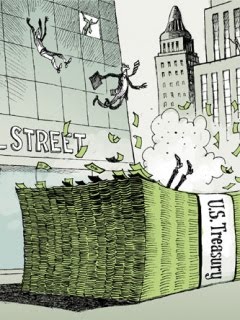I read this interesting post regarding speculative attack on the Australian dollar on the Contrarian Investors Journal. I am just wondering if the pound sterling today can take similar punishment. As of at the end of April 2010, the UK has US$71,132 million of foreign reserves (1). The exchange rate of the pound to other currencies is a floating one, unlike before Black Wednesday when the pound is pegged to the Deutsch Mark. Before I discuss in a little bit more detail about the attack on the pound, I want to go through the following points:
- The UK imports more than it exports so it is a current account deficit country. (2)
- Personal debt stands at £1,460 billion, which is higher than the country's GDP. (3)
- Public sector debt is at £893.4 billion (as of April 2010). That is 62.1% of the GDP.(4)
- UK's GDP is £1,438.6 billion (using April 2010 figures). (5)
- They borrow ten times the amount of the shorting position.
- They short the stock market.Then they will short the pound.
- In order to make it depreciate they will have to short the amount greater than the foreign reserves the UK has.
If the attack happens, the Bank of England might let the pound depreciate up to a certain extent, for example, on par with the euro. After that they will use their foreign reserves to buy the currency to support it.
What if the attack on the pound is too strong? The next move the Bank might take is to raise interest rates in order to make shorting expensive as possible for the attackers. Then the pain really starts in the UK economy. The following occurs in the likely order:
- Stock markets will fall.Real estate markets will suffer even more. Note that real estate prices started to fall when the Financial Crisis started in 2007.
- GDP will fall as the rest of the economy suffers as more businesses go bust so unemployment rises and the number of defaults goes up. Stagflation [combination of the two bad apples of stagnation and inflation] will occur.
- Risk of the UK losing its AAA status, resulting in higher interest rates for loans. That will delay the recovery even further.
What if the Bank manages to defeat the attackers? Well, the latter will suffer huge losses on the foreign exchange but they will still make huge profits in the lending market.
Either way, the UK economy will suffer as a result of the attack on the pound. However, the extent of the suffering depends on the actions and psychology of the market participants and the effectiveness of the Bank's and the FSA's actions to stabilise the pound and the markets respectively. I believe that the pound is less vulnerable to speculative attack compared to Black Wednesday when the UK was forced to withdraw from the Exchange Rate Mechanism when George Soros attacked the pound in a spectacular way by shorting it massively.
Source:
- Bank of England UK International Reserves and Foreign Currency Liquidity Template retrieved on 1/6/2010.
- The Economist (2010), Vol. 395, No. 8684, p.102.
- Credit Action retrieved on 106/2010.
- Office of National Statistics retrieved on 1/6/2010.
- Office of National Statistics retrieved on 1/6/2010. Note that the GDP is obtained by dividing the public sector debt by the percentage of the GDP, that is, £893.4bn/0.621 = £1438.6bn.
Note: The picture is from OnlineForex.net.





No comments:
Post a Comment